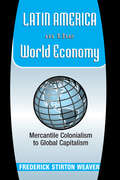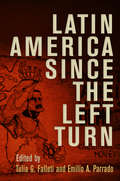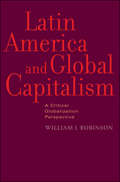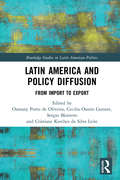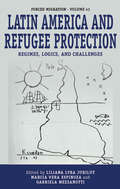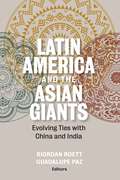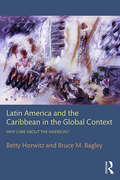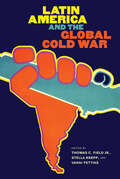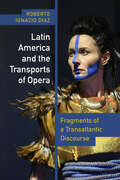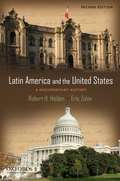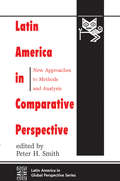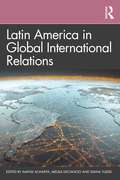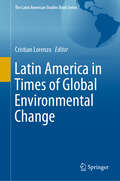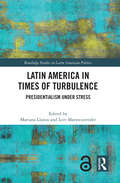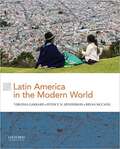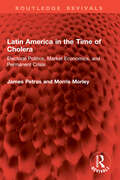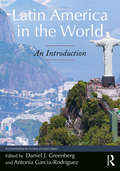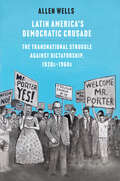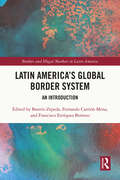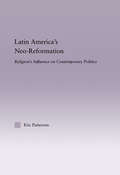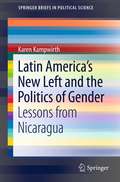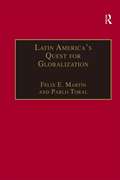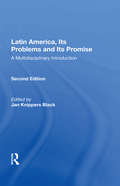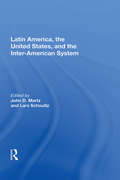- Table View
- List View
Latin America In The World Economy: Mercantile Colonialism To Global Capitalism (Latin American Perspectives Ser.)
by Frederick WeaverThis text considers the dual aspect of Latin American development: how external factors (phases of world capitalism since Columbus) interweave with internal factors (Latin American culture, politics, and social groups). Within his approach, Weaver demonstrates how domestic social conflicts and power relations have consistently capitalized on changes in the international economy, while, conversely, engagement with the international economy has consistently constrained local struggles and patterns of change.
Latin America Since the Left Turn (Democracy, Citizenship, and Constitutionalism)
by Tulia G. Falleti Emilio A. ParradoIn the early twenty-first century, the citizens of many Latin American countries, such as Argentina, Bolivia, Brazil, Ecuador, and Venezuela, elected left-wing governments, explicitly rejecting and attempting to reverse the policies of neoliberal structural economic adjustment that had prevailed in the region during the 1990s. However, in other countries such as Chile, Colombia, Mexico, and Peru continuity and even extension of the neoliberal agenda have been the norm.What were the consequences of rejecting the neoliberal consensus in Latin America? Why did some countries stay on the neoliberal course? Contributors to Latin America Since the Left Turn address these questions and more as they frame the tensions and contradictions that currently characterize Latin American societies and politics. Divided into three sections, the book begins with an examination of the political economy, from models of development, to taxation and spending patterns, to regionalization of trade and human migration. The second section analyzes the changes in democracy and political identities. The last part explores the themes of citizenship, constitutionalism, and new forms of civic participation. With essays by the foremost scholars in the field, Latin America Since the Left Turn not only delves into the cases of specific countries but also surveys the region as a whole.Contributors: Isabella Alcañiz, Sandra Botero, Marcella Cerrutti, George Ciccariello-Maher, Tula G. Falleti, Roberto Gargarella, Adrian Gurza Lavalle, Juliet Hooker, Evelyne Huber, Ernesto Isunza Vera, Nora Lustig, Paulina Ochoa Espejo, Emilio A. Parrado, Claudiney Pereira, Thamy Pogrebinschi, Irina Carlota Silber, David Smilde, John D. Stephens, Maristella Svampa, Oscar Vega Camacho, Gisela Zaremberg.
Latin America and Global Capitalism: A Critical Globalization Perspective (Johns Hopkins Studies in Globalization)
by William I. Robinson2009 Best Book, International Political Economy Group of the British International Studies AssociationThis ambitious volume chronicles and analyzes from a critical globalization perspective the social, economic, and political changes sweeping across Latin America from the 1970s through the present day. Sociologist William I. Robinson summarizes his theory of globalization and discusses how Latin America’s political economy has changed as the states integrate into the new global production and financial system, focusing specifically on the rise of nontraditional agricultural exports, the explosion of maquiladoras, transnational tourism, and the export of labor and the import of remittances. He follows with an overview of the clash among global capitalist forces, neoliberalism, and the new left in Latin America, looking closely at the challenges and dilemmas resistance movements face and their prospects for success.Through three case studies—the struggles of the region's indigenous peoples, the immigrants rights movement in the United States, and the Bolivarian Revolution in Venezuela—Robinson documents and explains the causes of regional socio-political tensions, provides a theoretical framework for understanding the present turbulence, and suggests possible outcomes to the conflicts.Based on years of fieldwork and empirical research, this study elucidates the tensions that globalization has created and shows why Latin America is a battleground for those seeking to shape the twenty-first century’s world order.
Latin America and Policy Diffusion: From Import to Export (Routledge Studies in Latin American Politics)
by Osmany Porto de Oliveira Sergio Montero Cecilia Osorio Gonnet Cristiane Kerches da Silva LeiteLatin American countries have for a long time been importers of public policies and institutions from the Global North. The colonial legacy and resulting patterns of international relations during the 20th century favoured a course of adoption and hybridization of political institutions. In recent decades, a new conjuncture has emerged in which Latin American policies have started to diffuse South-South and even South-North. Led by Brazil with Participatory Budgeting and the Bolsa Familia program, other countries in the region soon followed. The Bus Rapid Transit (BRT) system and bicycle policies in Curitiba and Bogotá have also reached wide international recognition and circulation. And yet, despite Latin America’s new role as a policy "exporter", little is known about its dynamics, causes, and effects. Why have Latin American policies been diffused inside and outside the region? Which actors are involved? What driving forces affect these processes? This innovative collection offers a new perspective on the policy diffusion phenomena. Drawing on different examples from Latin American experiences in urban local policies and national social policies, experts present a new framework to study this phenomenon centered on the mobilization of ideas, interests and discourses for policy diffusion. Latin America and Policy Diffusion will be of great interest to researchers, educators, advanced students and practitioners working in the fields of political science, public policy, international relations and Latin American Studies.
Latin America and Refugee Protection: Regimes, Logics and Challenges (Forced Migration #41)
by Liliana Lyra Jubilut, Marcia Vera Espinoza and Gabriela MezzanottiLooking at refugee protection in Latin America, this landmark edited collection assesses what the region has achieved in recent years. It analyses Latin America’s main documents in refugee protection, evaluates the particular aspects of different regimes, and reviews their emergence, development and effect, to develop understanding of refugee protection in the region. Drawing from multidisciplinary texts from both leading academics and practitioners, this comprehensive, innovative and highly topical book adopts an analytical framework to understand and improve Latin America’s protection of refugees.
Latin America and Refugee Protection: Regimes, Logics, and Challenges (Forced Migration #41)
by Liliana Lyra Jubilut, Marcia Vera Espinoza and Gabriela MezzanottiLooking at refugee protection in Latin America, this landmark edited collection assesses what the region has achieved in recent years. It analyses Latin America’s main documents in refugee protection, evaluates the particular aspects of different regimes, and reviews their emergence, development and effect, to develop understanding of refugee protection in the region. Drawing from multidisciplinary texts from both leading academics and practitioners, this comprehensive, innovative and highly topical book adopts an analytical framework to understand and improve Latin America’s protection of refugees.
Latin America and the Asian Giants: Evolving Ties with China and India
by Riordan Roett Guadalupe PazHow an evolving relationship with China and India is changing Latin America's political and economic dynamics.In the years since China has adopted a "going global" strategy to promote its overseas investment, expand export markets, and gain much-needed access to natural resources abroad, Sino-Latin American relations have both deepened and broadened at an unexpectedly rapid pace. The main driver behind this sea change in bilateral relations has been economic complementarity, with resource-rich countries in Latin America exporting primary goods to the Asian giants' growing market and China exporting manufactured goods back into the region. In recent years, Sino-Latin American relations have matured considerably, becoming far more nuanced and multifaceted than ever before.India is a relatively new player in the region, but has slowly strengthened its ties. As one of Asia's largest markets, it offers interesting parallels to the Chinese case. Will Indo-Latin American ties follow a similar path? The main areas of growth include trade and investment, mining, energy, information technology, motor vehicle production, and pharmaceuticals. To what extent these changing dynamics will redefine Latin America's relations with India is a question of increasing relevance for policymakers.This volume offers a review of key cross-regional trends and critical policy issues involving the changing relationship between these two Asian giants and Latin America. Selected country case studies-Argentina, Brazil, Chile, and Mexico-provide a more in-depth analysisof the implications of China's and India's evolving interaction with the region.
Latin America and the Caribbean in the Global Context: Why care about the Americas?
by Betty Horwitz Bruce M. BagleyCurrent perspectives on Latin America’s role in the world tend to focus on one question: Why is Latin America always falling behind? Analysts and scholars offer answers grounded in history, economic underdevelopment, or democratic consolidation. Bagley and Horwitz, however, shift the central question to ask why and to what extent does Latin America matter in world politics, both now and in the future. This text takes a holistic approach to analyze Latin America’s role in the international system. It invokes a combination of global, regional, and sub-regional levels to assess Latin America’s insertion into a globalized world, in historical, contemporary, and forward-looking perspectives. Conventional international relations theory and paradigms, introduced at the beginning, offer a useful lens through which to view four key themes: political economy, security, transnational issues and threats, and democratic consolidation. The full picture presented by this book breaks down the evolving power relationships in the hemisphere and the ways in which conflict and cooperation play out through international organizations and relations.
Latin America and the Global Cold War (The New Cold War History)
by Thomas C. Field Jr., Stella Krepp, and Vanni PettinàLatin America and the Global Cold War analyzes more than a dozen of Latin America's forgotten encounters with Africa, Asia, and the Communist world, and by placing the region in meaningful dialogue with the wider Global South, this volume produces the first truly global history of contemporary Latin America. It uncovers a multitude of overlapping and sometimes conflicting iterations of Third Worldist movements in Latin America, and offers insights for better understanding the region's past, as well as its possible futures, challenging us to consider how the Global Cold War continues to inform Latin America's ongoing political struggles. Contributors: Miguel Serra Coelho, Thomas C. Field Jr., Sarah Foss, Michelle Getchell, Eric Gettig, Alan McPherson, Stella Krepp, Eline van Ommen, Eugenia Palieraki, Vanni Pettina, Tobias Rupprecht, David M. K. Sheinin, Christy Thornton, Miriam Elizabeth Villanueva, and Odd Arne Westad.
Latin America and the Transports of Opera: Fragments of a Transatlantic Discourse (Performing Latin American and Caribbean Identities)
by Roberto Ignacio DíazLatin America and the Transports of Opera studies a series of episodes in the historical and textual convergence of a hallowed art form and a part of the world often regarded as peripheral. Perhaps unexpectedly, the archives of opera generate new arguments about several issues at the heart of the established discussion about Latin America: the allure of European cultural models; the ambivalence of exoticism; the claims of nationalism and cosmopolitanism; and, ultimately, the place of the region in the global circulation of the arts. Opera&’s transports concern literal and imagined journeys as well as the emotions that its stories and sounds trigger as they travel back and forth between Europe—the United States, too—and Latin America. Focusing mostly on librettos and other literary forms, this book analyzes Calderón de la Barca&’s baroque play on the myth of Venus and Adonis, set to music by a Spanish composer at Lima&’s viceregal court; Alejo Carpentier&’s neobaroque novella on Vivaldi&’s opera about Moctezuma; the entanglements of opera with class, gender, and ethnicity throughout Cuban history; music dramas about enslaved persons by Carlos Gomes and Hans Werner Henze, staged in Rio de Janeiro and Copenhagen; the uses of Latin American poetry and magical realism in works by John Adams and Daniel Catán; and a novel by Manuel Mujica Lainez set in Buenos Aires&’s Teatro Colón, plus a chamber opera about Victoria Ocampo with a libretto by Beatriz Sarlo. Close readings of these texts underscore the import and meanings of opera in Latin American cultural history.
Latin America and the United States: A Documentary History
by Eric Zolov Robert H. HoldenLatin America and the United States: A Documentary History brings together the most important documents on the history of the relationship between the United States and Latin America from the nineteenth century to the present. In addition to standard diplomatic sources, the book includes documents touching on the transnational concerns that are increasingly taught in the classroom, including economic relations, environmental matters, immigration, human rights, and culture. The collection illuminates key issues while representing a variety of interests and views as they have both persisted and shifted over time, including often-overlooked Latin American perspectives and U. S. public opinion. Now fully revised in its second edition, Latin America and the United States: A Documentary History features updated selections on current trends, including key new documents on immigration, regional integration, indigenous political movements, democratization, and economic policy. The second edition adds twenty-one documents and revises ten existing texts to ensure maximum clarity. The first edition's careful consideration of the Latin American perspective on hemispheric relations has been strengthened in the second edition, with many selections translated from the original Spanish by the editors. Comprehensive introductions to each document provide the reader with essential information about its historical context and significance. The book's detailed index identifies and cross-references the themes, events, problems, personalities, and nations discussed in both the documents and their introductions. Ideal for undergraduate and graduate courses in Latin American history and U. S. -Latin America relations, this book also serves as a unique reference tool for foreign policy professionals, international law specialists, journalists, and scholars in a variety of disciplines.
Latin America in Comparative Perspective: New Approaches to Methods and Analysis (Latin America in Global Perspective)
by Peter H Smith<p>This book, the inaugural publication in a multivolume series entitled Latin America in Global Perspective, highlights the necessity and feasibility of analyzing Latin American society and politics within broad comparative frameworks. <p>The rapidly changing agenda for social science research on the region calls for the rigorous application of new concepts and methodologies, especially in light of the apparent exhaustion of the “dependency” paradigm. The examination of broad themes, such as development strategies and processes of democratization, can be facilitated through systematic comparisons with other world regions, and the study of specific issues—such as electoral behavior or social inequality—requires the judicious use of quantitative measurement. The question, therefore, is not only what to investigate but also how. <p>This volume brings together original research by distinguished scholars from a variety of countries. Analytical chapters explore methodological strategies for cross-regional comparison, intraregional comparison, and the application of rational choice; topical chapters offer new approaches to the study of women, state power, corporatism, and political culture. A concluding section examines the political significance of public opinion research in Mexico, Peru, and the former Soviet Union.</p>
Latin America in Global International Relations
by Amitav Acharya Melisa Deciancio Diana TussieUsing decades of their own insight into teaching undergraduate International Relations (IR) courses, leading experts offer an introduction to IR thinking throughout history in Latin America, unfolding ideas, voices, concepts and approaches from the region that can contribute to the broader Global IR discussion. The book highlights and discuss the growing possibility of a Latin American agency, defined broadly to include both material and ideational elements, in regional and international relations, covering areas where Latin America’s contributions are especially visible and relevant, such as regionalism, international law, security management, and Latin America’s relations with the outside world. This is not about exclusively "Latin American solutions to Latin American problems", but rather about contributions in which Latin Americans define the terms for understanding the issues and set the terms for the nature and scope of outside involvement. Written with verve and clarity, Latin America in Global International Relations exposes readers to the relevance of redefining and broadening IR theory. It will serve as a guide for instructors in structuring their courses and in identifying the place of Latin America in the discipline.
Latin America in Times of Global Environmental Change (The Latin American Studies Book Series)
by Cristian LorenzoThis volume discusses the challenges of Latin America in global environmental geopolitics. Written by leading experts, this book brings together Latin American research on global environmental change. They cover a range of topics such as climate change, water, forest and biodiversity conservation connected with science policies, public opinion, priorities of international funds, and international politics of Latin American countries. The book describes the discrepancy between the international priorities and the regional needs or country interests. It includes several case studies and analyses the cooperation in multilateral negotiations on climate change. It also offers a synthesis of debates around global environmental changes and Latin American politics, which the authors have previously promoted in different academic events in South America, including in Santiago de Chile in Chile, and Buenos Aires and Ushuaia in Argentina.This book assesses the environmental problems from different perspectives, highlights the scientific development in the environmental changes affecting Latin America and offers a new view on geopolitics to help face those issues. Specialist readers in international relations, political sciences, environmental sciences, geography and geopolitics will appreciate this up-to-date examination of Latin America and the global environmental change.
Latin America in Times of Turbulence: Presidentialism under Stress (Routledge Studies in Latin American Politics)
by Leiv Marsteintredet Mariana LlanosThis book accounts for and analyses the latest developments in Latin American presidential democracies, with a special focus on political institutions. The stellar line-up of renowned scholars of Latin American politics and institutions from Latin America, Europe, and the United States offer new insights into how democratic institutions have operated within the critical context that marked the political and social life of the region in the last few years: the eruption of popular protest and discontent, the widespread distrust of political institutions, and, of course, the COVID-19 pandemic. Combining different methodological approaches, including cross-national studies, small-N studies, case studies, and quantitative and qualitative data, the contributions cluster around three themes: the problem with fixed terms and other features of presidentialism, inter-institutional relations and executive accountability, and old and new threats to democracy in these times of turmoil. The volume concludes with an assessment of the political consequences of the COVID-19 pandemic in Latin America. Beyond current scholars and students of comparative political scientists, Latin America in Times of Turbulence will be of great interest to a wide spectrum of readers interested in comparative systems of government, democracy studies, and Latin American politics more generally.
Latin America in the Modern World
by Peter V. N. Henderson Bryan McCann Virginia GarrardLatin America in the Modern World is the first text to situate the history of Latin America within a wider global narrative. Written by leading scholars, the book focuses on five themes: state formation; the construction of national identity through popular culture and religion; economics and commodities; race, class, and gender; and the environment. Emphasizing the distinct experiences of each of the Latin American countries, the book provides students with an entry point into understanding this vital region. Instead of suggesting that all Latin American nations have an interchangeable heritage, the authors seek to clearly identify themes, topics, people, and intellectual currents that help to knit the history of modern Latin America into a coherent category of study. While providing in-depth coverage of the history of the three largest Latin American countries (Mexico, Brazil, and Argentina), Latin America in the Modern World also offers case studies from almost all of the countries, including Central American and Andean nations.
Latin America in the Time of Cholera: Electoral Politics, Market Economics, and Permanent Crisis (Routledge Revivals)
by Morris Morley James PetrasFirst published in 1992, Latin America in the Time of Cholera questions many ideas regarding the advent of a new era of democracy, peace, and north-south cooperation for development in the post-Cold War period by challenging several myths that shape United States policy toward Latin America. James Petras and Morris Morley trenchantly argue that electoral regimes and free markets in the hemisphere have not improved people’s lives, that Washington’s neo-conservative allies do not have a viable future, and that the end of the Cold War has not lessened U. S. interventionist behavior in Latin America.This book utilizes empirical and historical analyses and provides a unique interpretive framework that focuses on U. S. involvement in the so-called democraticization of Latin America. It also presents a lively combination of both case studies and critiques of contemporary power relations. This compelling account of Latin America will be an invaluable resource for academics, policymakers, journalists, and anyone who wishes to make sense of tumultuous events in this region.
Latin America in the World: An Introduction (Foundations in Global Studies)
by Antonia Garcia-Rodriguez Daniel J. GreenbergFrom the Foundations in Global Studies series, this text offers students a fresh, comprehensive, multidisciplinary entry point to Latin America. After a brief introduction to the study of the region, the early chapters of the book survey the essentials of Latin American history; important historical narratives; and the region’s languages, religions, and global connections. Students are guided through the material with relevant maps, resource boxes, and text boxes that support and guide further independent exploration of the topics at hand. The second half of the book features interdisciplinary case studies, each of which focuses on a specific country or subregion and a particular issue. Each chapter gives a flavor for the cultural distinctiveness of the particular country yet also draws attention to global linkages. Readers will come away from this book with an understanding of the larger historical, political, and cultural frameworks that shaped Latin America as we know it today, and of current issues that have relevance in Latin America and beyond.
Latin America's Democratic Crusade: The Transnational Struggle against Dictatorship, 1920s-1960s
by Allen WellsBy emphasizing Latin American reformers’ decades-long struggle to defeat authoritarianism, this transnational history challenges the timeworn Cold War paradigm and recasts the region’s political evolution Scholars persist in framing the Cold War as a battle between left and right, one in which the Global South is cast as either witting or unwitting proxies of Washington and Moscow. What if the era is told from the perspective of the many who preferred reform to revolution? Scholars have routinely neglected, dismissed, or caricatured moderate politicians. In this book, Allen Wells argues that until the Cuban Revolution, the struggle was not between capitalism and communism—that was Washington’s abiding preoccupation—but between democracy and dictatorship. Beginning in the 1920s, the fight against authoritarianism was contested on multiple fronts—political, ideological, and cultural—taking on the dimensions of a political crusade. Convinced that despots represented an existential threat, reformers declared that no civilian government was safe until the cancer of dictatorship was excised from the hemisphere. Dictators retaliated, often with deadly results, exporting strategies that had been honed at home to guarantee their political survival. Grafted onto this war without borders was a belated Cold War, with all its political convulsions, the aftershocks of which are still felt today.
Latin America's Global Border System: An Introduction (Borders and Illegal Markets in Latin America)
by Beatriz ZepedaLatin America’s Global Border System is the opening volume in the first collection of academic works devoted exclusively to borders and illegal markets in Latin America. This volume features expert discussions on border issues of Argentina, Brazil, Bolivia, Ecuador, Guatemala, Italy, Mexico and Peru, as well as studies on illegal markets, cities, and gender as a first step to understanding the intricacies of the global border system of illegal markets and Latin America’s role in it. The book constitutes a valuable source of information on the geographic, economic, demographic, and social characteristics of the most important Latin American border regions, and their relation to global illegal markets, while also offering valuable insights into the ways illegal markets are organized in each country and how they connect across borders to create the global border system. This book will not only be a valuable resource for academics and students of international relations, security studies, border studies and contemporary Latin America, but will also prove relevant to national and international policy-makers devoted to foreign, security and development policies.
Latin America's Neo-Reformation: Religion's Influence on Contemporary Politics
by Eric PattersonThe purpose of this study is to focus on the intersection of religion and politics. Do different religions result in different politics? More specifically, are there significant contrasts between the political attitudes and behavior of Catholics and Protestants in Latin America?
Latin America's New Left and the Politics of Gender
by Karen KampwirthThe majority of Latin Americans now live in countries that are governed by democratically elected governments on the political left, which is unprecedented in that region. This book analyzes this occurrence by asking a question that up until now has been largely ignored in the literature on the contemporary Latin American left: to what extent have these governments governed with, and promoting the interests of, the women's movements that are an important part of their base of support? This question is examined by focusing on a critical case that is rarely analyzed in the literature on the new Latin American left, the case of Nicaragua. The broader implications for Latin America will be shown, making this book of interest to researchers and graduate students in Latin American studies as well as gender studies and political science.
Latin America's Quest for Globalization: The Role of Spanish Firms (The International Political Economy of New Regionalisms Series)
by Pablo Toral Félix E. MartínInvestments by Spanish firms in Latin America have grown since the early 1990s by taking over many of the state-owned firms put out to tender. Second only to the United States, these investments make Spain one of the largest markets of foreign direct investment for Latin America. This multidisciplinary volume focuses on the emergence of Spanish multinational enterprises in this region. Furthermore, it analyzes the sociological and political consequences of these investments and exhibits several theoretical and methodological approaches that make the book a useful aid for teaching. It is essential reading for those who want to understand structural reforms, their consequences and the international impact of economic reform.
Latin America, Its Problems And Its Promise: A Multidisciplinary Introduction, Second Edition
by Jan Knippers BlackThis textbook, extensively revised and updated in this new second edition, introduces the student to what is most basic and most interesting about Latin America. The authors-each widely recognized in his or her own discipline, as well as among Latin Americanists-analyze both the enduring features of the area and the pace and direction of change. Th
Latin America, The United States, And The Interamerican System
by Lars Schoultz John D. MartzThis collection of original essays focuses on the dynamics of the contemporary system of inter-American relations, with emphasis on changes in the hemispheric political economy, the control exercised by the United States over the behavior of Latin American governments, and the issue of human rights. The authors discuss varying facets of the complex
